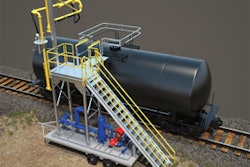TOPEKA, Kan. (AP) — Department of Homeland Security officials told a panel of researchers on Friday that a new animal research lab slated to be built in Kansas still is needed, even though federal funds are scarce.
Undersecretary Tara O'Toole said during a public hearing in Washington that the threat of existing and emerging animal health disease remains real and construction of the proposed National Bio- and Agro-Defense Facility in Kansas should move forward.
New cost estimates discussed Friday place the price tag at $1.14 billion to design and build the facility. DHS officials said the increased cost was attributed to changes in the design of the lab to mitigate the possibility of a release of deadly pathogen.
O'Toole said DHS doesn't have the money or facilities to conduct the necessary research on emerging and existing diseases, such as foot and mouth disease, because of shrinking federal spending and revenues.
"I want you to understand that this tension will exist. You can't do research without modern facilities. But the money for modern facilities comes out of the same piggy bank for research," she said. "I think this is one of those wicked problems for which there is no complete or satisfying answer."
A panel of the National Research Council is reviewing plans for the lab, which is to be built near Kansas State University in Manhattan.
The National Research Council is part of the National Academy of Sciences. The committee is examining to what extent the threat to livestock posed by infectious diseases, including current and emerging diseases and bioterrorist agents. The review will include studying relevant articles and reports on the topic.
Based on those findings, the committee will identify the laboratory and infrastructure that is needed to counter the threats to maintain public health, animal health and food safety in the United States.
The committee will look at the need to continue to build the lab as designed, scale the project back or maintain the decades-old Plum Island lab in New York and use so-called "Level 4" labs in Canada and Australia for research and analysis of diseases. The Kansas facility would be a Level 4 lab, with access to ongoing research at Kansas State and animal health companies located in the region.
However, DHS officials told the panel Friday that time is a critical factor in detecting a disease and responding to an outbreak.
"It is not good policy to rely on foreign partners," said James Johnson, DHS director, of the Office of National Laboratories in the science and technology directorate.
The committee is expected to issue its report by June 30.
Kansas officials have committed $105 million in bonding authority to assist with NBAF's construction, including building a utility plant for the lab. Brownback and others have said the state is looking at other alternatives for helping fund the project, should federal money dry up.
A site has been prepared for construction on the north side of the Kansas State campus. O'Toole said the design on the lab is 75 percent complete.
Stephen Higgs, research director at Kansas State's Biosecurity Research Institute, said the facility had the capacity to handle additional animal disease research, including projects that are to be transferred in the coming years from Plum Island. A federal budget proposal would allocate $10 million to bring some of that work to Kansas during the next year.
Higgs said the Biosecurity Research Institute was continuing to go through training and certification since it opened in 2010. Those processes will allow scientists and researcher to work on a variety of animal diseases. The institute is adjacent to the site where work continues on the new federal lab.
"The state of Kansas has invested a lot in this. We believe it has to be built," Higgs said. "We're ready, willing and able to be that springboard for NBAF."
Kansas has pledged $110 million toward the cost of building NBAF, of which $35 million has been allocated.






















